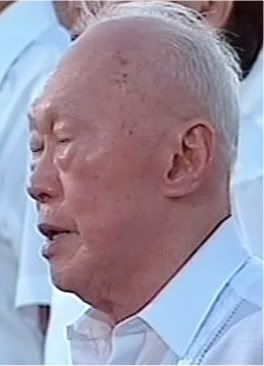http://www.asiaone.com/Health/Women%27s+Matters/Story/A1Story20090917-168495.html
Tue, Sep 22, 2009
The Straits Times

Mood swings
By Dr Brian Yeo
Mariam stepped into my consultation room in a low-cut dress, filling the space with her strong perfume scent. Married and in her mid-30s, she was a high-flying executive in the creative industry.
She has always been sociable and loquacious. But, from the moment she walked in, she was talking fast, gesticulating extensively and was openly flirtatious.
Beaming, she announced that she had recently signed up for several spa packages, joined a fitness gym and bought two branded bags. Then, in a conspiratorial voice, she told me she had had an extra-marital affair.
Mariam has manic-depressive disorder.
On this visit, she was clearly in the manic state, as seen in her extremely elated mood, rapid and excited speech and her grand plans coupled with poor control over her impulses for pleasure.
Under such circumstances, she could easily be taken advantage of by others and be vulnerable to spending whimsically.
We have all come across people who seem all of a sudden to be highly energetic and even full of ideas. However, in a full-blown manic state, they are not their usual selves and may not be able to socialise normally. Some even become irritable.
Those with manic-depressive disorder are prone to depression after their manic episode. Their depression can be severe with low mood, poor sleep, appetite loss and thoughts of harming themselves.
This extreme mood swing is why manic-depressive disorder is also called bipolar disorder, as the patient's mood can fluctuate. He can go from being euphoric and energetic to being depressed and suicidal.
The risk of developing manic depressive disorder in one's lifetime varies from 0.4 to 1.6 per cent.
For classical depression, more women suffer from it than men. However, both sexes are equally prone to suffer from bipolar disorder.
There are two major challenges in treating people with bipolar disorder.
First, the patient needs to be aggressively treated while in the manic phase - when he feels euphoric and able to do anything and everything all at once.
He wants to stay in this elated state, so the last thing he wants is treatment that will take him off his 'high". Because of his diminished sense of reality, counselling alone is of little use.
Indeed, hospital admission - even if it is against his will - so that he can receive medication may be necessary.
The other challenge is when the patient is in the depressed state. This time, he may need anti-depressant medication if he does not respond well to counselling.
Yet it is important that the attending physician monitors the effect of the anti-depressant medication as there is a risk of the patient swinging quickly from the depressed state to the manic state.
Indeed, many patients need to be put on long-term mood stabiliser medication.
In Mariam's case, I decided she needed to be hospitalised to calm her elated state. Her family was told to ensure that she remained on the mood-stabilising medication to keep her on an even keel even when she appeared to be well.
Marital therapy was initiated for her husband, who was upset by her indiscretions.
Also, with her consent, letters were sent to the spa company and the health gym where Mariam had signed contracts, to help her get out of these contracts and have part of her deposits returned, on medical grounds.
Someone like Mariam will need to have her emotional state monitored to prevent any relapse.
It is very important that medication be given at the early 'high' stage - before a full-blown relapse occurs.
Now back to her usual chirpy but controlled self, Mariam said she was embarrassed by her recent manic relapse but admitted that she had enjoyed the attention male colleagues showered on her, as well as the energy and sexual rush she had felt in her elated state.
When she is neither manic nor depressive, Mariam is well aware that any impulsive behaviour can affect her loved ones. She wants to be more careful in monitoring herself and does not resent the fact that her family members are now more vigilant and watching for early signs of any relapse.
Bipolar disorder patients are challenging to treat as they can function very well in between episodes. In fact, there are many famous authors and businessmen with this disorder and many attribute having these mood swings as the source of their energy and creativity.
Yet, they are all too aware that things can and do rapidly go downhill in a relapse.
Regular follow-ups and reviews of the prescribed medication are key to their attaining an equilibrium despite the challenges and stresses of urban living.
Bipolar disorder patients can remain well, although their mood states can seem to be slightly more exuberant or more morose compared to that of their friends and colleagues.
[email protected]
Dr Brian Yeo is a consultant psychiatrist in private practice and an adjunct associate professor at the department of psychological medicine at the Yong Loo Lin School of Medicine, National University of Singapore. He is also a certified master substance abuse counsellor and is currently the Singapore Medical Association's representative to the Board of Management, Singapore Anti-Narcotics Association.
This article was first published in Mind Your Body, The Straits Times.
Tue, Sep 22, 2009
The Straits Times

Mood swings
By Dr Brian Yeo
Mariam stepped into my consultation room in a low-cut dress, filling the space with her strong perfume scent. Married and in her mid-30s, she was a high-flying executive in the creative industry.
She has always been sociable and loquacious. But, from the moment she walked in, she was talking fast, gesticulating extensively and was openly flirtatious.
Beaming, she announced that she had recently signed up for several spa packages, joined a fitness gym and bought two branded bags. Then, in a conspiratorial voice, she told me she had had an extra-marital affair.
Mariam has manic-depressive disorder.
On this visit, she was clearly in the manic state, as seen in her extremely elated mood, rapid and excited speech and her grand plans coupled with poor control over her impulses for pleasure.
Under such circumstances, she could easily be taken advantage of by others and be vulnerable to spending whimsically.
We have all come across people who seem all of a sudden to be highly energetic and even full of ideas. However, in a full-blown manic state, they are not their usual selves and may not be able to socialise normally. Some even become irritable.
Those with manic-depressive disorder are prone to depression after their manic episode. Their depression can be severe with low mood, poor sleep, appetite loss and thoughts of harming themselves.
This extreme mood swing is why manic-depressive disorder is also called bipolar disorder, as the patient's mood can fluctuate. He can go from being euphoric and energetic to being depressed and suicidal.
The risk of developing manic depressive disorder in one's lifetime varies from 0.4 to 1.6 per cent.
For classical depression, more women suffer from it than men. However, both sexes are equally prone to suffer from bipolar disorder.
There are two major challenges in treating people with bipolar disorder.
First, the patient needs to be aggressively treated while in the manic phase - when he feels euphoric and able to do anything and everything all at once.
He wants to stay in this elated state, so the last thing he wants is treatment that will take him off his 'high". Because of his diminished sense of reality, counselling alone is of little use.
Indeed, hospital admission - even if it is against his will - so that he can receive medication may be necessary.
The other challenge is when the patient is in the depressed state. This time, he may need anti-depressant medication if he does not respond well to counselling.
Yet it is important that the attending physician monitors the effect of the anti-depressant medication as there is a risk of the patient swinging quickly from the depressed state to the manic state.
Indeed, many patients need to be put on long-term mood stabiliser medication.
In Mariam's case, I decided she needed to be hospitalised to calm her elated state. Her family was told to ensure that she remained on the mood-stabilising medication to keep her on an even keel even when she appeared to be well.
Marital therapy was initiated for her husband, who was upset by her indiscretions.
Also, with her consent, letters were sent to the spa company and the health gym where Mariam had signed contracts, to help her get out of these contracts and have part of her deposits returned, on medical grounds.
Someone like Mariam will need to have her emotional state monitored to prevent any relapse.
It is very important that medication be given at the early 'high' stage - before a full-blown relapse occurs.
Now back to her usual chirpy but controlled self, Mariam said she was embarrassed by her recent manic relapse but admitted that she had enjoyed the attention male colleagues showered on her, as well as the energy and sexual rush she had felt in her elated state.
When she is neither manic nor depressive, Mariam is well aware that any impulsive behaviour can affect her loved ones. She wants to be more careful in monitoring herself and does not resent the fact that her family members are now more vigilant and watching for early signs of any relapse.
Bipolar disorder patients are challenging to treat as they can function very well in between episodes. In fact, there are many famous authors and businessmen with this disorder and many attribute having these mood swings as the source of their energy and creativity.
Yet, they are all too aware that things can and do rapidly go downhill in a relapse.
Regular follow-ups and reviews of the prescribed medication are key to their attaining an equilibrium despite the challenges and stresses of urban living.
Bipolar disorder patients can remain well, although their mood states can seem to be slightly more exuberant or more morose compared to that of their friends and colleagues.
[email protected]
Dr Brian Yeo is a consultant psychiatrist in private practice and an adjunct associate professor at the department of psychological medicine at the Yong Loo Lin School of Medicine, National University of Singapore. He is also a certified master substance abuse counsellor and is currently the Singapore Medical Association's representative to the Board of Management, Singapore Anti-Narcotics Association.
This article was first published in Mind Your Body, The Straits Times.



 like to fuck ard and be a slut say so lah.. mood swing my foot.
like to fuck ard and be a slut say so lah.. mood swing my foot.


